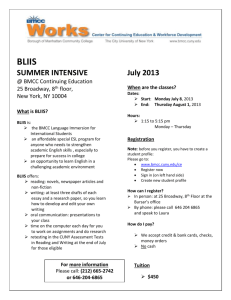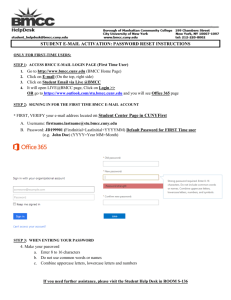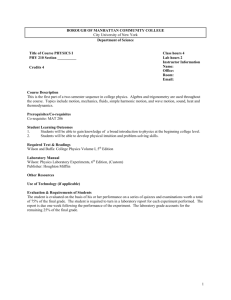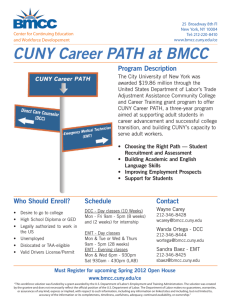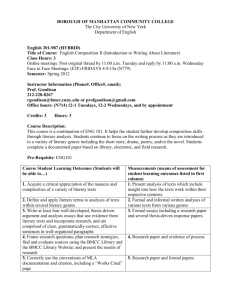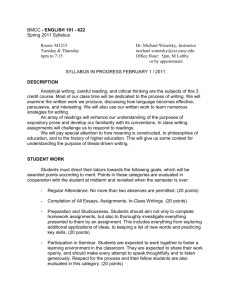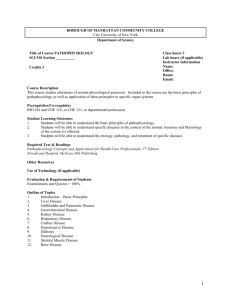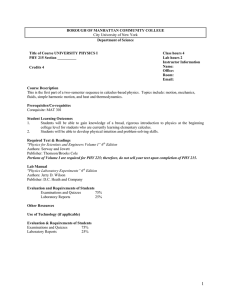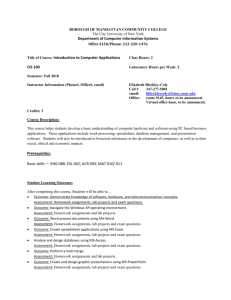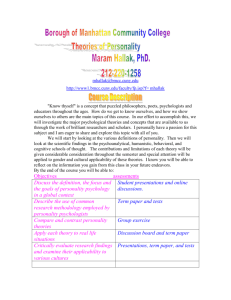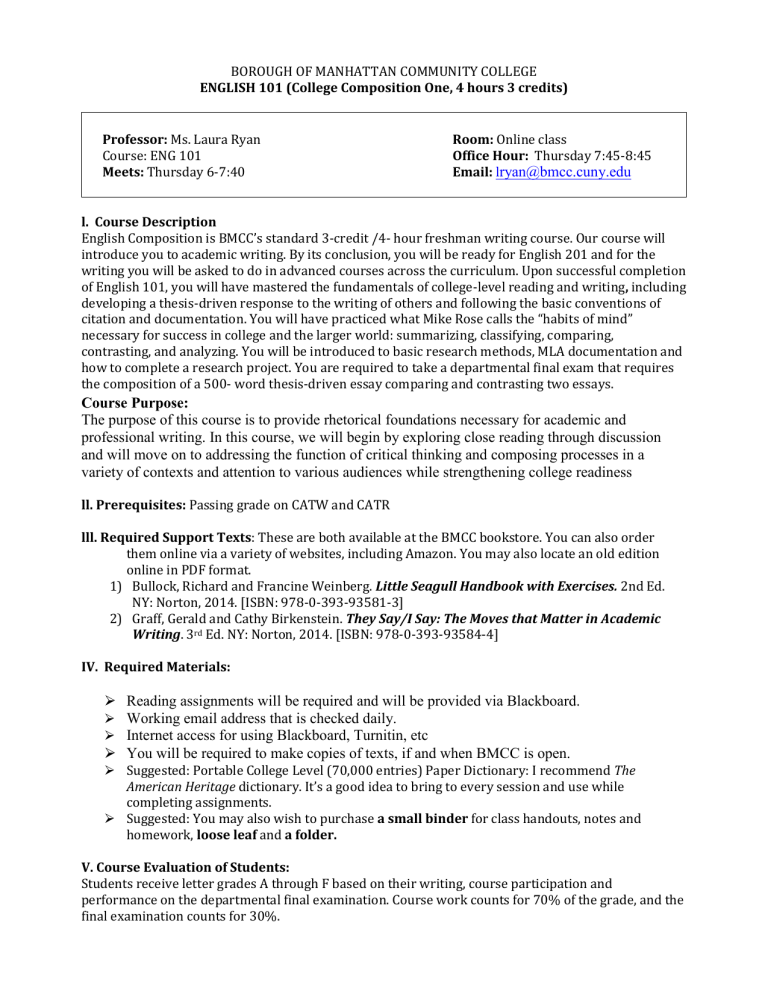
BOROUGH OF MANHATTAN COMMUNITY COLLEGE ENGLISH 101 (College Composition One, 4 hours 3 credits) Professor: Ms. Laura Ryan Course: ENG 101 Meets: Thursday 6-7:40 Room: Online class Office Hour: Thursday 7:45-8:45 Email: lryan@bmcc.cuny.edu l. Course Description English Composition is BMCC’s standard 3-credit /4- hour freshman writing course. Our course will introduce you to academic writing. By its conclusion, you will be ready for English 201 and for the writing you will be asked to do in advanced courses across the curriculum. Upon successful completion of English 101, you will have mastered the fundamentals of college-level reading and writing, including developing a thesis-driven response to the writing of others and following the basic conventions of citation and documentation. You will have practiced what Mike Rose calls the “habits of mind” necessary for success in college and the larger world: summarizing, classifying, comparing, contrasting, and analyzing. You will be introduced to basic research methods, MLA documentation and how to complete a research project. You are required to take a departmental final exam that requires the composition of a 500- word thesis-driven essay comparing and contrasting two essays. Course Purpose: The purpose of this course is to provide rhetorical foundations necessary for academic and professional writing. In this course, we will begin by exploring close reading through discussion and will move on to addressing the function of critical thinking and composing processes in a variety of contexts and attention to various audiences while strengthening college readiness ll. Prerequisites: Passing grade on CATW and CATR lll. Required Support Texts: These are both available at the BMCC bookstore. You can also order them online via a variety of websites, including Amazon. You may also locate an old edition online in PDF format. 1) Bullock, Richard and Francine Weinberg. Little Seagull Handbook with Exercises. 2nd Ed. NY: Norton, 2014. [ISBN: 978-0-393-93581-3] 2) Graff, Gerald and Cathy Birkenstein. They Say/I Say: The Moves that Matter in Academic Writing. 3rd Ed. NY: Norton, 2014. [ISBN: 978-0-393-93584-4] IV. Required Materials: ⮚ Reading assignments will be required and will be provided via Blackboard. ⮚ Working email address that is checked daily. ⮚ Internet access for using Blackboard, Turnitin, etc ⮚ You will be required to make copies of texts, if and when BMCC is open. ⮚ Suggested: Portable College Level (70,000 entries) Paper Dictionary: I recommend The American Heritage dictionary. It’s a good idea to bring to every session and use while completing assignments. ⮚ Suggested: You may also wish to purchase a small binder for class handouts, notes and homework, loose leaf and a folder. V. Course Evaluation of Students: Students receive letter grades A through F based on their writing, course participation and performance on the departmental final examination. Course work counts for 70% of the grade, and the final examination counts for 30%. Em By the conclusion of English 101, students will have completed four formal thesis-driven essays, most of which will have gone through multiple drafts. One of these will be in class in order to prepare for the final. Each essay will make use of summary, paraphrase, and quotation as well as analysis and argument. You must hand in all assigned essays to pass class. You will be working with a peer in class when editing early drafts. It is most important to be in class on peer editing days. If you have an excused reason for being out that day, you will need to make alternate arrangements for peer editing. I will do my best to help out. The “final draft” of your essay will be due the following week. For each unit, you will hand in an early rough draft, related homework and the final draft. Together, these essays comprise 40% of the course grade. Each subsequent essay will count more and more will be expected with each essay. Essay 1 will 5% of your class grade and Essay 2 will be 10%, for instance. Additional course work includes readings, HW questions and reflections on reading and writing assignment via Black Board discussion boards, journals and voice threads, quizzes, , group work, and peer-review workshops. Your dedication at home will be reflected in your level of class participation. Homework and class participation comprise 30% of the course grade. Students are responsible for work covered on days missed due to absence. Be sure to have at least 3 classmates’ contact info. Essays and homework need to be handed on time. Late homework is not accepted. Homework needs to be completed to participate fully in live sessions and in module activities. Late Essays will be marked down 10 points for each late module; an A- will become a B-. “Late papers” are problematic because our class requires constant writing in order for you to get your skills in order for the final and for 201! Don’t get behind. Hand in what you have and move on. If you are struggling, TALK TO ME! Not participating because you are having a hard time is not the answer. If you let me know what’s up, we can usually figure out a solution. If you are unable to participate in discussions during class or online because you haven’t done the reading, your participation grade will suffer. Preparation for class includes completing all assigned writing and reading work and bringing necessary materials. If you miss a live session, you are responsible for reviewing the notes from class I will post online. If you do not understand our readings or discussion, be sure to ask questions! Partake in class activities by engaging in class discussions, shared class writing and group activities. Student Engagement: This include are variety of ways to interact with our class. Among them are: Discussion boards, blogs, journal assignments and quizzes and class participation during our live sessions. 30% Class Essays: 40% 40% Essay #1: Partner Introduction 5% Essay #2: My Generation 10% Essay #3: How We Learn. Our first draft will be timed to help prepare everyone for the final. 15% Research Writing Component: Educational Experts on the Learning Process. 10% Final Exam: 30%. The departmental exam requires a timed, 500 word, thesis-driven essay, citing two assigned essays to support your position 30% Student-Instructor Interaction Expectations: I will provide in the form of weekly announcements, personalized feedback on every assignment (within 7 days of the due date), discussion board moderation, and possibly individual emails or messages through Blackboard. I will also hold virtual office hours via Zoom, so we can talk one to one. Please do respond to all questions I ask across these channels. I reach out to you because I want you to be successful in E101 so you can be successful in your future classes as well. Writing well is essential for college success, no matter your major! BMCC Grading is as follows: 100-93 = A 92-90 = A89-87 = B+ 83-86 = B 80-82 = B79-77 = C+ 73-76 = C 70-72 = C69-67 = D+ 63-66 = D 60-62 = D0-59%= F Vl. Course Requirements: 1. Steady, punctual attendance and class participation are essential for success in class. Missing class, arriving late and not participating in our various online activities will make it difficult to master the material and achieve a good grade in our class. Please do show up to class and arrive on time. It is always great to see you!! As outlined on BB, I believe that your regular participation in class is key to your own learning and to your classmates. I do want to see you in class every week. However, if you are dealing with tough challenges, speak with me during office hours and we will figure out a work around that will support your success. Students facing challenges with immigration issues, securing food or housing, who believe this may affect their performance in the course please notify me if you are comfortable doing so at laura50ny@msn.com. If you prefer, you may contact the Office of Student Affairs (Room S350, 212-220-8130, studentaffairs@bmcc.cuny.edu, http://www.bmcc.cuny.edu/students/studentaffairs.jsp), or visit BMCC's Single Stop for help accessing all available services. Note: a student has to be active, not just visit, an online course in order to be considered in attendance according to the reporting agents. Attendance affects student aid and is reported as required by law. As we begin promptly, late arrivals interrupt class during group work, quizzes and reflections on readings. If you plan to be absent, please email me as soon as you know. If you are absent 2 weeks in a row, definitely get in touch and let me know how you are. If I don’t see you, I may assume you have dropped. Stay in touch. 2. Preparation: When you come to class, it’s best to be prepared. Be sure to complete the work assigned for a given class and bring necessary materials. I indicate the needed handouts for each live session. Have them available. If possible, PRINT OUT the night before. 3. Organization: Keep all handouts in your binder or folder, real or virtual. Try your best with printing while the school is closed. Keep corrected work organized by date of return so we can keep close track of your progress. Save all your work on a USB drive or a free Google Docs or iCloud account. Late HW and HW or essays via email are not accepted. Getting behind creates stress. Slow and steady wins the race. Navigating the Course in Blackboard This is an online course, meaning instruction is online. The most important rule overall is to make this course a daily habit. This means check your BMCC email every day, open up Blackboard and check announcements a couple of times a week, and read your course module at the beginning of the week to ensure that you are caught up and on top of all assignments. You will not necessarily have to do a task or assignment for the course every day, but you must check email, Blackboard, and course schedule as part of your regular routine. You may want to enter due dates into a calendar and set reminders. Late work is not accepted. This is a big rule in my course. Late work is not accepted. The course is set up for ease of navigation and understanding where you should be and what you should be doing at all times. Assignments and activities are in folders, one for each week of the semester, with a corresponding module button along the left side of the main Blackboard page. To begin the course, click the "START HERE" link in the left menu. The second most important rule is this: ask questions if you do not understand the course navigation or an assignment, or you cannot find something! Click "Contact Professor" on the left for my email address. I usually respond within 24 hours except on weekends. I will post announcements in Blackboard throughout the course to remind you about important deadlines, provide summary feedback on assignments, and to clarify anything that students may have questions about. Due Dates: Assignments are due each week by Monday at 11:59 pm, and all Discussion Board Response Posts are due each week by Wednesday at 11:59 pm. Essays are due by Wednesday at 11:59. You can expect a grade and feedback on any assignment or discussion board participation in this course within 7 days of the due date. Note that late work is not accepted. Contact me ahead of time if for any reason you anticipate you will not be able to complete an assignment on time. Minimum Technology Required -All students are required to have daily access to a working computer during the semester. The course cannot be taken from a phone or tablet, as Blackboard is not fully supported on those devices. For a list of web browsers that are supported by Blackboard see https://help.blackboard.com/Learn/Student/Getting_Started/Browser_Support While I use Chrome, I do find Firefox and Mozilla may be more BB friendly. -Access to the United States Internet system is required. Some countries do not have agreements for exchange of information making online classes impossible. Access is your responsibility. -Working BMCC Email. You can access your free BMCC email through CUNY Portal or BMCC’s Homepage. -Microsoft Office 365 is free with your BMCC enrollment. Download it for free on your computer through your BMCC Portal account or access it through your BMCC Email. It is located at the top right hand corner. For a list of system requirements for running Office 365 products, see https://products.office.com/en-us/office-system-requirements. *Please see the Student Help and Resources located in the course tabs for further contacts and help with all technology and E-learning issues. Technical Support If you need assistance with your student email account or the username/password you use to log into campus computers or campus wifi, you can visit the BMCC Service Desk. BMCC Service Desk Room S-141 212-220-8379 servicedesk@bmcc.cuny.edu https://ccc.bmcc.cuny.edu/ E-Learning Support https://www.bmcc.cuny.edu/academics/elearning/ E-Learning Center 199 Chambers St, Room S510a New York, NY 10007 Phone: 212-220-1243 Email: elearning@bmcc.cuny.edu Student Data and Privacy Your personal data is secure and kept private within the Blackboard learning management system, VoiceThread, and ProctorU. All digital tools used for this course are compliant with the CUNY policy on protecting student data. Web Accessibility This course utilizes the following web applications and platforms, all of which take measures to ensure that all students can access content and effectively use their tools. A link to accessibility statements from each vendor can be found below. ■ Blackboard learning management system (LMS): https://www.blackboard.com/blackboard-accessibility-commitment ■ YouTube video hosting and streaming: https://support.google.com/youtube/answer/189278?hl=en ■ ProctorU remote proctoring: https://www.proctoru.com/accessibilitystatement ■ VoiceThread interactive multimedia: https://voicethread.com/about/features/accessibility Technical Skills -Ability to navigate CUNY’s Blackboard. The E-learning Center provides a helpful orientation on this that is worked into our course, located in the Course Tabs. -Using email and email attachments. To problem solve and communicate effectively, emails and attachments may be necessary between student and instructor. -Creating and submitting files in and between commonly used programs such as Office 365 and Blackboard. -Downloading and installing software, such as those needed for browsers and Office 365. -Creating PowerPoint presentations with media, videos and sound embedded in the presentation format. -Creating YouTube videos. Digital Information Literacy Skills -Use of online libraries and databases to locate and collect information. -Use computer networks to locate and store files or data. -Use online search tools for specific academic purposes, including the ability to use search criteria, keywords and filters. -We will learn to properly cite information sources. -We will prepare a presentation of research findings. *Knowledge of making a video through your phone or computer webcam are not a prerequisite, but will be learned through the course assignments. If you do not have means to make a video, you may visit the E-learning Center to use the equipment with an appointment. Please contact me with questions about any added support. Typing, PowerPoint, research and Word skills are helpful while taking this course, but will also be part of our practice to improve college readiness. College Help and Resources: To see help and resources from across the college, ranging from IT to counseling, click the “Help and Resources” link in the left-hand course menu. VII. My Pet Peeves: “Is there extra credit?” Eating during class. “You gave me a B but I need an A.” Passive listeners (See above) If you do not care about the material, and cannot make yourself care, I know a trick: PRETEND to care. Participate in class by asking and answering questions and making comments in small and large group discussions. And you know what, you’ll begin to care, and you’ll get that good grade you’re after. BMCC Policy on Class Participation Participation in the academic activity of each course is a significant component of the learning process and plays a major role in determining overall student academic achievement. Academic activities may include, but are not limited to, attending class, submitting assignments, engaging in in-class or online activities, taking exams, and/or participating in group work. Each instructor has the right to establish their own class participation policy, and it is each student’s responsibility to be familiar with and follow the participation policies for each course. BMCC Policy on Lateness Classes begin promptly at the times indicated in the Schedule of Classes. Arrival in classes after the scheduled start time constitutes lateness. Latecomers may, at the discretion of the instructor, incur an official absence. BMCC is committed to the health and well‐being of all students. It is common for everyone to seek assistance at some point in their life, and there are free and confidential services on campus that can help. Single Stop www.bmcc.cuny.edu/singlestop, room S230, 212‐220‐8195. If you are having problems with food or housing insecurity, finances, health insurance or anything else that might get in the way of your studies at BMCC, come by the Single Stop Office for advice and assistance. Assistance is also available through the Office of Student Affairs, S350, 212‐220‐8130. Counseling Center www.bmcc.cuny.edu/counseling, room S343, 212‐220‐8140. Counselors assist students in addressing psychological and adjustment issues (i.e., depression, anxiety, and relationships) and can help with stress, time management and more. Counselors are available for walk‐in visits. Office of Compliance and Diversity www.bmcc cuny.edu/aac, room S701, 212-220-1236. BMCC is committed to promoting a diverse and inclusive learning environment free of unlawful discrimination/harassment, including sexual harassment, where all students are treated fairly. For information about BMCC's policies and resources, or to request additional assistance in this area, please visit or call the office, or email olevy@bmcc.cuny.edu, ortwade@bmcc.cuny.edu. If you need immediate assistance, please contact BMCC Public safety at 212-220-8080. Office of Accessibility www.bmcc.cuny.edu/accessibility, room N360 (accessible entrance: 77 Harrison Street), 212-220-8180. This office collaborates with students who have documented disabilities, to coordinate support services, reasonable accommodations, and programs that enable equal access to education and college life. To request an accommodation due to a documented disability, please visit or call the office. BMCC Policy on Plagiarism and Academic Integrity Statement Plagiarism is the presentation of someone else’s ideas, words or artistic, scientific, or technical work as one’s own creation. Using the idea or work of another is permissible only when the original author is identified. Paraphrasing and summarizing, as well as direct quotations, require citations to the original source. Plagiarism may be intentional or unintentional. Lack of dishonest intent does not necessarily absolve a student of responsibility for plagiarism. Students who are unsure how and when to provide documentation are advised to consult with their instructors. The library has guides designed to help students to appropriately identify a cited work. The full policy can be found on BMCC’s Web site,www.bmcc.cuny.edu. For further information on integrity and behavior, please consult the college bulletin (also available online). Student Handbook and other College Policies For more information, please consult the Student Handbook by following this link: https://www.bmcc.cuny.edu/wp-content/uploads/ported/communications/pdfs/handbook/current.pdf For the schedule of times where drop/add of courses is allowed, see the academic calendar at https://www.bmcc.cuny.edu/academics/academic-calendar/ For information on how to drop/add courses, see https://www.bmcc.cuny.edu/wp- content/uploads/ported/registrar/upload/How_To_Drop_Withdraw.pdf Departmental Student Learning (Course) Outcomes ● ● ● ● ● CO1: Organize, develop, and revise at least three thesis-driven essays (approximately 3000 words) that include substantial support and use a variety of rhetorical strategies [Measurements: discussion board assignments, journal assignments. quizzes and essays including drafts and revisions, one in-class essay, three revised essays, departmental final exam] CO2: Summarize, paraphrase, and quote from readings [Measurements: discussion boards; graded essays, journal homework assignments, departmental final exam] CO3: Critically analyze numerous readings [Measurements: graded essays, voice threads, discussion boards, journals and final exam] CO4: Demonstrate a command of edited American English, using vocabulary and syntax appropriate to college-level work [Measurements: discussion boards, graded essays, departmental final exam] CO5: Demonstrate a knowledge of the MLA conventions of citation and documentation [Measurements: Discussion Boards, quizzes, graded essays, departmental final exam, research component] General Education Outcomes CO6: Communication Skills: Students will write, read, listen, and speak critically and effectively. [Measurement: class discussions, graded essays, departmental final exam] ● CO7: Information & Technology Literacy- Students will be able to collect, evaluate and interpret information and effectively use information technologies. [Measurement: online class literacy, discussion boards, blogs, research, research component] ● CO8: Values: Students will make informed choices based on an understanding of personal values, human diversity, multicultural awareness, and social responsibility. [Measurement: graded essays in response to course themes of learning, language and identity] ● Pathways Outcomes ● CO9: Read and listen critically and analytically, including identifying an argument’s major assumptions and assertions and evaluating its supporting evidence.[Measurements: interviews and research; homework assignments summarizing/analyzing/responding to readings by class readings and final exam readings; graded thesis driven essay; departmental final exam based on readings assigned by the department] CO10: Write clearly and coherently in varied, academic formats (such as formal essays, research papers, and reports) using standard English and appropriate technology to critique and improve one’s own and others’ texts. [Measurements: four thesis driven essays- drafts and revisions on assigned readings; self and peer review assignments providing written feedback on own and others’ drafts; departmental final exam] ● CO11: Demonstrate research skills using appropriate technology, including gathering, evaluating, and synthesizing primary and secondary sources.[Measurements: research component exploring issue in education identified by individual student in college library, databases, and other source material; persuasive essay making argument in relation to this issue using sources explored and documented in assignments] ● CO12: Support a thesis with well-reasoned arguments, and communicate persuasively across a variety of contexts, purposes, audiences, and media [Measurements: revised graded essays in different rhetorical modes and situations; departmental final exam] ● CO13: Formulate original ideas and relate them to the ideas of others by employing the conventions of ethical attribution and citation.[Measurements: essays #1-3 in response to ideas of course readings, thesis-driven essay #4 on current educational problem modeled on course readings that support an original thesis about topic researched with support documented utilizing conventions of MLA ethical attribution and citation.] ● Netiquette Please review this material, be familiar with the core principles of netiquette and please follow these guidelines during the term of this course: BMCC is committed to providing courses that meet the highest standards. As such, students are expected to maintain a standard of conduct. A challenge in the online classroom is understanding the meaning of communications without the visual and auditory clues from the speaker. Netiquette provides some basic guidelines about how to behave in an online format, such as not using all capital letters online because that represents the vocal equivalent of shouting. In addition to these basics, please remember that this is an academic course where much of the work is taking place online. It is not the same as communicating with friends via social media, nor is it equivalent to sending text messages to friends or colleagues. These guidelines below will help you reduce online miscommunications in this course. General Netiquette Rules: ● Make the Connection. Electronic communication (email, discussion forums, etc.) is how you share ideas with other participants in this course. Online environments can separate the person from the ideas received in this course. Remember, like you, someone is on the other side of an email or discussion posting. Communicate with fellow participants as you would in a face-to-face course. ● Be Professional. Your coursework is more than learning facts; you are preparing for a career. You are learning to interact with your fellow course participants as you would in your future professional life. Your conduct in this course should reflect this. Your communication should follow standard rules for grammar and spelling (unless in an online chat) and be clear, concise and intelligent. Have Opinions. Everyone is entitled to have an opinion. In discussion forums, everyone is encouraged to share them. Respect Disagreement. People have the right to disagree with you. However, disagreement should never be personal. Online discussions are a means to share ideas and practice the skill of persuasion. ersuasive speech cannot be achieved with hurtful, hateful or inappropriate language. Review your posts before you publish and reread them for unintended meanings. Ask Questions. Cultural influences can influence communication in terms of phrasing and word choice. The lack of visual and auditory clues may affect meaning, as well. Before jumping to conclusions, ask for clarification. Be Forgiving. For the majority of participants, online communication is straightforward. Sometimes unintended meanings are conveyed. ● ● ● ● Specific Rules for this Course: During online Discussion Board work there will be penalty imposed for misspellings, sentence fragments or for employing commonly used chat acronyms - keyboard shortcuts. As an instructor, I will accept slang or emoticons in context to work. Since this is an English class, we are practicing clarity and grammar in our work. ● You will be graded on the work you do during this semester this includes your threaded discussions. Your ideas and wording must be your own. Failure to do so will earn you a 0 for the first offense and failure of the class for subsequent offenses, no matter when they are discovered. Recycling work from a previous class or through repeating my class is considered plagiarism. ● The course and school use Standard English for measurement. In this course, Standard English is expected within reason to context. ● You may be required to present work in which your person (ex: you may be asked to film yourself reading a poem) is featured in some way. In no way will this be shared with others if you request otherwise. ● Conflicts Online behavior is not always perfect. In fact, it can venture into disrespectful and hurtful areas and needs to be addressed. If you experience any questionable or outright inappropriate behavior from your fellow course participants, please let me know. This Netiquette policy was adapted from Howard Community College’s Netiquette Statement and Virgina Shea’s The Core Rules of Netiquette. Saving the Best for Last: BMCC offers a lot of support to English 101 students through a variety of tutoring support. You can ask questions via email or chat. They have group sessions and 1-1 tutoring. There are tutors specially trained to work with ELLs in 101. I can’t recommend their offerings enough. Be sure to pay them a visit. The programs have moved online, and last semester my students said it was still very helpful. RESOURCES FOR 101 STUDENTS The Learning Resource Center: To help make your college career a success, the Learning Resource Center (LRC) offers students academic support services to strengthen academic skills and meet their learning needs. The LRC is located in Room S510 and all services are available free of charge to registered BMCC students. The LRC offers academic coaching, tutoring, workshops and events (especially around final exams time), and computer labs. Contact: Hours (while classes are in session) Tutorial Program: (212) 220-1383 Monday–Thursday: 8:00 a.m.–10:00 p.m. Computer Labs: (212) 220-1381 or 1382 Friday: 8:00 a.m.–7:00 p.m. E-Tutoring: (212) 220-1380 Saturday: 9:00 a.m.–5:00 p.m. Online Tutoring: (212) 220-8359 Sunday: 10:00 a.m. –5:00 p.m. General Info Email: lrc@bmcc.cuny.edu Tutoring Email: lrctutoring@bmcc.cuny.edu Online Tutoring Email: onlinetutoring@bmcc.cuny.edu The BMCC Writing Center at 199 Chambers Street in Room S-510 teaches registered students to think critically, write actively, revise mindfully and proofread carefully. In addition, we provide support for faculty who are incorporating writing pedagogy into their curricula. The Writing Center offers One-to-One Tutoring for Students. A sixty (60) minute, one on one tutorial with a writing professional is at the heart of our service. We teach students to develop, organize, draft, revise, and proofread their work. Make an appointment at http://www.bmcc.cuny.edu/writingcenter/ Or you can also come to our office in room S-510 on the Main Campus or call (212) 220-1384 during our business hours to make an appointment. The Writing Center Offers Many Types of Assistance, including: ● ● ● ● ● ● ● ● ● ● ● ● Understanding Assignments Understanding the Syllabus Understanding/Analyzing Texts Brainstorming Introductions Conclusions Transitions Thesis Statements Topic Sentences Research Transfer Essays Scholarship Essays Responding to Feedback Formatting Paragraphing Grammar Considering Audience Critical Thinking Evidence and Support Ethical Use of Sources Documentation and Proper Citation Style ● Cover Letters ● Resumes ● ● ● ● ● ● ● ● ● The English as a Second Language (ESL) Lab at BMCC is located in Room S-510J at 199 Chambers St. in the Learning Resource Center (Room S-510). The ESL Lab is here to help students improve their English skills (grammar, reading, listening/speaking/pronunciation, and vocabulary). The ESL Lab offers: ● tutoring for all ESL courses at all ESL Tutoring Hours levels (ESL 49/54, ESL 94, ESL 95) Monday - Thursday: 10:00 am - 8:00 pm ● walk-in tutoring and conversation Friday: 10:00 a.m. - 4:00 p.m. groups Saturday: 10:00 a.m. - 4:00 p.m. ● English writing and grammar software Staff ● a lending library of books in English Joshua P Belknap, ESL Lab Coordinator ● audio books and CDs/DVDs to assist Altagracia Soldevilla, ESL Lab Evening students in improving their English Supervisor speaking and listening skills Saundra Miyashiro, ESL Lab Weekend ● ESL students may use the computers in Supervisor the lab to do research for their writing Contact projects and print out their essays. Room S-510J, 199 Chambers St. (212) 220-1422 ESL Lab Hours Monday - Thursday: 9:00 a.m. - 9:00 jbelknap@bmcc.cuny.edu p.m. Friday: 9:00 a.m. - 4:00 p.m. Saturday: 10:00 a.m. - 4:00 p.m. Outline of Topics August 1. Thurs. 27 September 2. Thurs. 03 Essay Assignments Due Syllabus/Mumia/ Intro to Essay Structure Mumia/ Essay Structure Review Thesis: L.A.D. / Peer Feedback 3. Thurs. 10 Mumia/ Detail Development/Interview 4. Thurs. 17 Mumia/ S-N-S Details Generation essay introduced Early draft of short essay #1 on classmate due, 3 pp. for peer Review, 3 pp Education Unit: Article by Kie Ho Final draft of short essay #1 on classmate due, 3 pp. Aspects of Composition Education Unit: Articles Kie Ho and Gregory Early draft of essay #2 on Generation due for peer development, 4 pp. 5. Thurs. 24 October 6. Thurs. 7. Thurs. 8. Thurs. 9. Thurs. 01 08 15 Education Unit: Gregory. Introducing Douglass and Quotation Use. Final draft of essay #2 on Generation due, 4pp. Education Unit: Douglass and Gregory Comparison. Introduce Keller Timed essay #3 on Education 22 Education and Research Unit: Keller and quote analysis and support Final draft of essay #3 on Education due, 4-5 pp. 10. Thurs. 29 Research Unit: MLA citation and supporting sources November 11. Thurs. 05 Quote integration/Thesis Works Cited Page Final Draft of Essay #4 Research on Learning 12. Thurs. 12 Final Exam Readings Final draft Works Cited Page due 13. Thurs. 19 Final Exam Readings STUDY 26 NO CLASS Thanksgiving Thurs. December 14. Thurs. 15. Thurs. Thurs. 03 Final Exam Readings STUDY 10 In Class Exam Final Exam 17 Class meeting for term wrap up Finals Week
